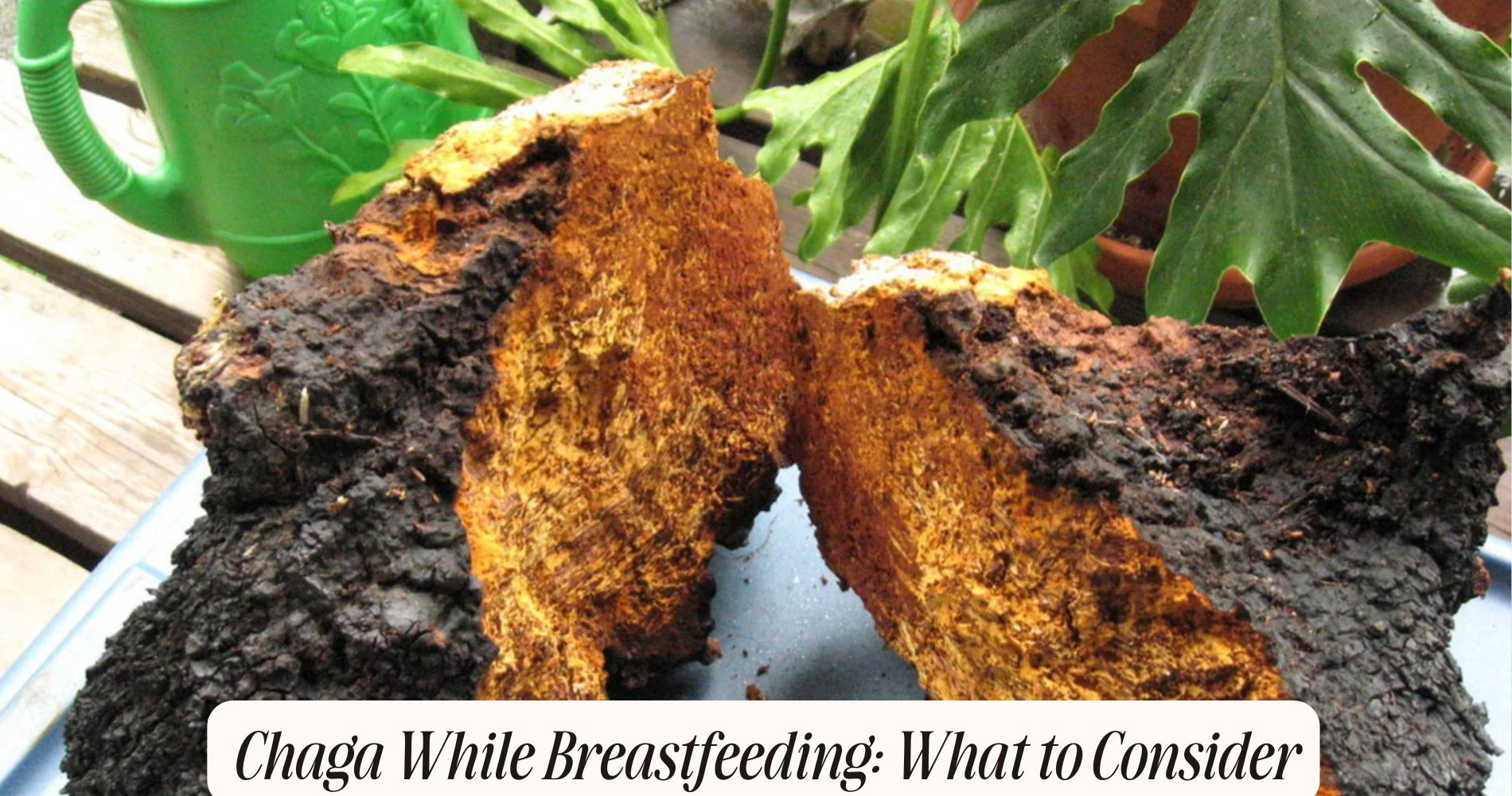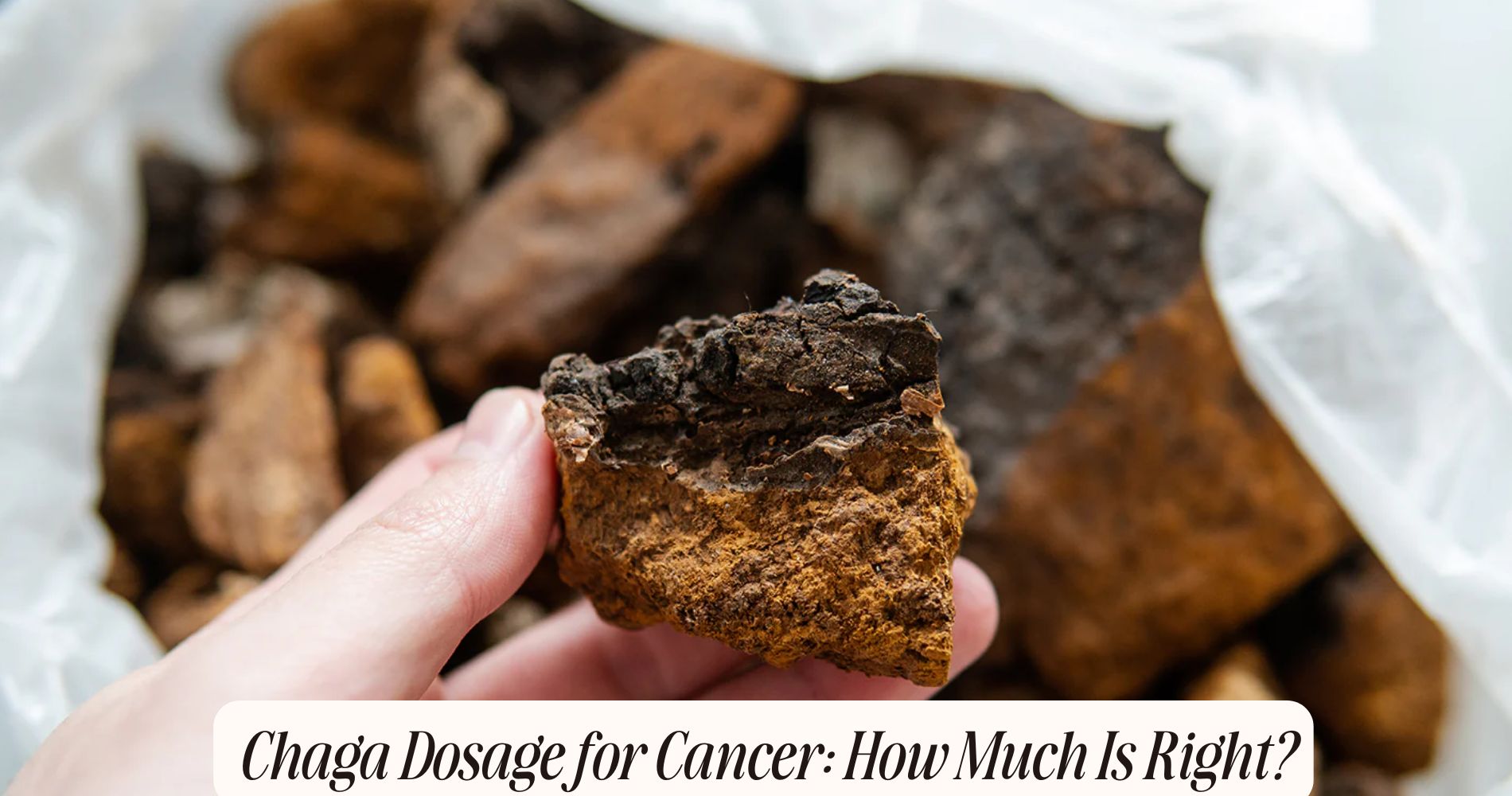
Chaga While Breastfeeding: What to Consider
When considering chaga while breastfeeding, it's essential to weigh its potential benefits against risks. Chaga is packed with antioxidants and may enhance your immune system, but its compounds could alter breast milk composition and nutrient absorption. Start with a low dose to monitor any allergic reactions, especially if you have mushroom sensitivities. Additionally, be mindful of possible interactions with medications. Consulting your healthcare provider helps guarantee you make safe dietary choices for both you and your baby. By taking these considerations into account, you can better navigate your journey with chaga and its effects on breastfeeding.
Understanding Chaga Benefits
Chaga, a fungus that grows on birch trees, boasts a range of potential health benefits that can be particularly appealing for new mothers. Its rich history dates back centuries, especially in traditional medicine among Siberian cultures, where it was revered for its healing properties.
As a new mom, you might find comfort in knowing that chaga is packed with antioxidants, which can help combat oxidative stress and support your immune system during this demanding time.
Incorporating chaga into your daily routine can be simple, thanks to various chaga recipes available online. You can brew it as a tea, mix it into smoothies, or even use it in soups for added nutrition. These recipes not only enhance your meals but also provide you with an easy way to enjoy the benefits of this unique fungus.

While research on chaga is still emerging, many new mothers have reported positive experiences, ranging from increased energy levels to improved overall well-being.
Just remember to consult with your healthcare provider before adding any new supplements or foods to your diet while breastfeeding, ensuring it aligns with your individual health needs.
Nutritional Profile of Chaga
When you consider incorporating chaga into your diet, it's important to understand its impressive nutritional profile. Chaga, a mushroom known for its medicinal properties, is packed with essential nutrients and bioactive compounds that can benefit your health.
One of the standout chaga properties is its high antioxidant content, which helps combat oxidative stress in your body. These antioxidants, primarily in the form of polyphenols and superoxide dismutase, work synergistically to protect your cells from damage.
Additionally, chaga contains beta-glucans, which support your immune system by enhancing your body's natural defenses.

Moreover, chaga is rich in vitamins and minerals, including B vitamins, vitamin D, potassium, and zinc. These nutrients can be particularly beneficial during breastfeeding, as they contribute to both your well-being and the quality of your breast milk.
With its unique blend of chaga compounds, this mushroom not only supports your immune function but also provides a range of nutrients that can be advantageous when you're nursing.
As you consider adding chaga to your routine, you'll appreciate how it can complement your overall health.
Potential Risks for Breastfeeding
When considering chaga while breastfeeding, it's important to understand the potential risks involved.
The nutritional impact on your milk, possible allergic reactions, and concerns about herb-drug interactions can all affect both you and your baby.
Staying informed and consulting with a healthcare provider can help guarantee you make the safest choices.
Nutritional Impact on Milk
Research indicates that certain nutritional components in Chaga can potentially influence breast milk composition. This means that when you consume Chaga while breastfeeding, it might alter the nutrients available in your milk. Chaga is rich in antioxidants, polysaccharides, and vitamins, which can enhance overall health, but their effects on milk composition deserve careful consideration.
One area of concern is how Chaga may affect nutrient absorption. Some studies suggest that certain compounds in Chaga can interact with the digestive system, possibly influencing how your body absorbs nutrients. If your body isn't absorbing nutrients effectively, it could lead to a decrease in the quality of your breast milk, which is vital for your baby's growth and development.
Additionally, the unique phytochemicals in Chaga mightn't be fully understood regarding their impact on lactation. While many mothers seek to enhance their diets with superfoods like Chaga, it's important to weigh the potential benefits against the possible risks to your milk composition.
Always consult your healthcare provider before adding new supplements to your diet during breastfeeding to guarantee that both you and your baby are getting the best nutrition possible.
Allergic Reactions Potential Risk
A significant concern for breastfeeding mothers considering Chaga is the potential for allergic reactions. While Chaga is generally considered safe for most people, it can trigger an immune response in those with sensitivities to mushrooms or related fungi. If you have a history of allergies, especially to mushrooms, it's prudent to approach Chaga with caution.
Allergic reactions can manifest in various ways, including skin rashes, gastrointestinal discomfort, or respiratory issues. Since your baby's immune system is still developing, any adverse reactions you experience could potentially affect your breastfeeding journey. If you notice any unusual symptoms after consuming Chaga, it's important to discontinue use and consult your healthcare provider.
Additionally, while allergic reactions are rare, they can occur unpredictably. It's advisable to start with a small dose to see how your body reacts before incorporating it more prominently into your routine.
Monitoring your body's response is vital, as even minor reactions can indicate a more significant issue. By staying informed and cautious, you can make a well-rounded decision about whether Chaga fits into your breastfeeding experience.
Always prioritize both your health and your baby's well-being.
Herb-Drug Interaction Concerns
Considering the potential for herb-drug interactions is vital for breastfeeding mothers who are thinking about incorporating Chaga into their routine. While Chaga is often praised for its health benefits, it may interfere with the medication effects of certain drugs. This is particularly important for breastfeeding mothers who often take medications for postpartum recovery or other health conditions.

Research indicates that Chaga can affect the metabolism of various medications, potentially altering their effectiveness or increasing the risk of side effects. For example, Chaga may inhibit enzymes like CYP450, which play a significant role in drug metabolism. If you're taking medications that rely on this pathway, it's essential to consult your healthcare provider before adding Chaga to your regimen.
Additionally, be aware that the combined effects of herb interactions can be unpredictable, especially in breastfeeding. These interactions might affect not only your health but also the quality of breast milk and, ultimately, your baby's well-being.
Always prioritize open communication with your healthcare provider to guarantee that any herbal supplements you consider are safe and won't interfere with your medications. Your health and your baby's safety should always come first.
Effects on Breast Milk
Chaga mushrooms frequently draw interest for their potential health benefits, but their effects on breast milk warrant careful consideration. When you're breastfeeding, it's vital to understand how chaga might influence breast milk composition. Research indicates that certain metabolites from chaga can be transferred into breast milk, which could affect your baby's nutrient intake.
Chaga is rich in antioxidants and polysaccharides, which may contribute to its health-promoting properties. However, the impact of these chaga metabolites on both your breast milk and your baby isn't fully understood.
While some studies suggest that these compounds could enhance immune function, there's limited research on how they interact with breast milk and whether they alter its nutritional balance.
It's important to remember that while chaga may offer health benefits, you should be cautious about introducing it into your diet while breastfeeding. Any changes in your dietary habits can affect breast milk composition, impacting your baby's development.
If you decide to include chaga, monitor how you and your baby respond, and consider the potential implications carefully. Prioritizing both your health and your baby's well-being is essential during this significant time.
Consulting Healthcare Professionals
When you're maneuvering dietary choices while breastfeeding, consulting healthcare professionals is vital. These experts can provide you with the necessary insights and recommendations tailored to your individual health needs.
When considering the inclusion of chaga in your diet, professional guidance is indispensable. Healthcare providers can help you understand any potential interactions chaga might've with medications you're taking or other dietary supplements. They can also assess your overall health and nutritional status, making certain that your choices support both your well-being and that of your breastfeeding baby.
The consultation importance can't be overstated—breastfeeding mothers have unique nutritional requirements, and making informed choices is essential for maintaining a balanced diet. Your healthcare professional can also address any concerns you may have about the safety of specific herbs or supplements, including chaga, during this sensitive period.

Incorporating their advice into your dietary decisions helps you feel confident that you're making the best choices for yourself and your little one.
Don't hesitate to reach out to a qualified healthcare provider to discuss your dietary plans and make sure you're on the right track.
Dosage Recommendations
Understanding the right dosage of chaga while breastfeeding is essential for both your health and your baby's safety. While chaga is generally considered safe, it's important to adhere to recommended dosages to avoid potential side effects.
Most studies suggest that a daily intake of 1 to 2 grams of chaga extract is appropriate for adults. However, since you're breastfeeding, starting at the lower end of this range is wise.
You should also consider how chaga is consumed. If you're drinking chaga tea, a safe consumption guideline would be about one to two cups per day, prepared from 1 to 2 grams of dried chaga.
Always monitor how your body responds, as individual tolerances can vary. It's important to stay hydrated and maintain a balanced diet to support both your health and lactation.
Before introducing chaga or any supplement, discussing it with your healthcare provider is important. They can offer personalized advice based on your specific health needs and breastfeeding journey.
Alternative Natural Remedies
If you're looking for alternative natural remedies while breastfeeding, you're not alone—many mothers seek safe options to support their health during this time. Holistic healing approaches can be particularly beneficial, helping you address various health needs without compromising your milk supply or your baby's wellbeing.
Consider herbal teas made from ingredients like chamomile or peppermint, which can aid digestion and promote relaxation.
Additionally, essential oils such as lavender and eucalyptus may provide soothing effects when used in a diffuser, creating a calming environment for both you and your baby.
You might also explore natural alternatives like probiotics, which can support both your gut health and that of your little one. Foods rich in omega-3 fatty acids, like salmon or flaxseeds, can help boost your mood and provide essential nutrients.
Always consult with a healthcare provider before introducing any new remedy to guarantee it aligns with your specific needs.
Signs of Allergic Reactions
When introducing Chaga into your diet while breastfeeding, it's essential to watch for signs of allergic reactions.
Common symptoms can include rashes, itching, or gastrointestinal issues, which may indicate your body is reacting negatively.
Additionally, be aware of any risk factors, such as a history of allergies or sensitivities, as these could increase your chances of experiencing an adverse reaction.
Common Allergic Symptoms
Have you ever noticed unusual reactions after consuming certain foods or supplements? If you've recently added chaga to your diet while breastfeeding, it's important to be aware of common allergic symptoms. Your body may respond to allergy triggers, leading to an immune response that manifests in various ways.
Some common symptoms to watch for include skin reactions like hives, rashes, or itching. You might also experience gastrointestinal issues such as nausea, vomiting, or diarrhea.
In more severe cases, respiratory symptoms like wheezing, difficulty breathing, or a swollen throat can occur. These reactions can develop shortly after consuming chaga or might take hours to appear, so it's important to stay vigilant.

If you notice any of these symptoms, it's wise to consult your healthcare provider. They can help determine whether chaga is the culprit or if something else might be causing the reaction.
Risk Factors to Consider
Being aware of the risk factors associated with allergic reactions is vital, especially while breastfeeding. When considering chaga sourcing, you should verify that the product you choose is reputable and free from contaminants. Poor-quality chaga can lead to allergic responses, putting both you and your baby at risk.
As you incorporate chaga into your breastfeeding practices, it's important to monitor for any signs of allergic reactions. Symptoms like hives, swelling, or difficulty breathing can indicate a serious issue. If you notice these signs, stop consuming chaga immediately and consult your healthcare provider.
Additionally, be mindful of any personal allergies you might have; if you're allergic to mushrooms or related fungi, chaga could trigger a reaction. It's wise to start with a small amount to assess your body's response before increasing your intake.
Lastly, consider your baby's age and health—infants have sensitive systems, and what you consume can affect them. By staying informed and cautious, you can better navigate the potential risks while enjoying the benefits of chaga during your breastfeeding journey.
Personal Experiences and Anecdotes
For many breastfeeding mothers, the decision to incorporate Chaga into their diet often stems from personal experiences and shared anecdotes within their communities.
You might hear stories from friends or family about how Chaga helped them boost their energy levels or improved their immune health during their breastfeeding journeys. These personal stories can be quite compelling, as they offer insights into the potential benefits of this mushroom.
Some mothers have reported that adding Chaga to their smoothies or teas made them feel more balanced and supported during those demanding early months of motherhood.
Others might share that they noticed a positive impact on their overall well-being, allowing them to better care for their little ones.
While these anecdotes can be encouraging, it's important to remember that everyone's body responds differently.
What works for one mother may not work for another. Listening to others' experiences can provide valuable perspective, but it's vital to weigh these personal stories against your own health needs and preferences.
Engaging in discussions with fellow mothers can enrich your understanding as you navigate your unique breastfeeding journey.
Making an Informed Choice
When considering the addition of Chaga to your breastfeeding routine, it's important to gather reliable information and weigh the potential benefits against any risks.
Chaga mushrooms are known for their antioxidant properties and potential immune support, which might be appealing during the demanding breastfeeding phase. However, it's important to look at benefits comparison studies to understand how Chaga interacts with lactation.
You should also take into account personal experiences shared by other breastfeeding mothers. While some report positive outcomes, such as increased energy and improved immune function, others may have concerns about possible side effects or lack of research on Chaga's effects on breast milk.
Consulting with a healthcare professional is essential before introducing any new supplement. They can provide guidance based on your unique health situation and breastfeeding journey.
It's important to stay informed and make choices that prioritize both your well-being and your baby's health. Ultimately, the decision should feel right for you. By arming yourself with information and considering all aspects, you can make a balanced choice about including Chaga in your breastfeeding routine.
Enhance Your Wellness with Well Gummies' Ultimate Wellness Bundle
For a convenient and delicious way to boost your health while breastfeeding, the Ultimate Wellness Bundle from Well Gummies is the perfect solution. This gum chew product combines All-in-One Mushroom Gummies for daily nourishment with Lion's Mane Focus and Energy Gummies for an extra boost when needed. With 10 types of mushrooms, these vegan gummies fuel your brain, support your immune system, and provide calm energy without jitters or crashes. Enjoy the fresh wild berry flavor, as tasty as your favorite candy, and experience all-day vitality naturally!
Frequently Asked Questions
Can Chaga Affect My Baby's Sleep Patterns While Breastfeeding?
Chaga's benefits, like immune support, can be appealing, but precautions are essential. It might affect your baby's sleep patterns, so it's wise to consult with a healthcare provider before incorporating it into your routine.
Is It Safe to Combine Chaga With Other Herbal Remedies?
Combining chaga with other herbal remedies can pose risks due to potential chaga interactions. Always prioritize herbal safety by consulting a healthcare professional before mixing them, ensuring you and your baby remain healthy and safe.
How Long Does Chaga Stay in Breast Milk?
Chaga's compounds can appear in breast milk, but specific duration isn't well studied. If you choose to use chaga for its benefits, consult your doctor about appropriate dosages to ascertain safety for you and your baby.
Are There Specific Brands of Chaga Recommended for Breastfeeding Mothers?
When choosing a chaga brand, consider brand comparisons and check dosage guidelines. Look for products that guarantee quality and safety, prioritizing those with third-party testing to support your health and your baby's wellbeing.
Can Chaga Cause Digestive Issues in Breastfeeding Mothers?
Chaga can cause digestive issues in some people, so it's important to monitor your body's response. While Chaga benefits are notable, practicing caution with Chaga precautions guarantees you maintain your digestive health during breastfeeding.
Conclusion
In summary, while chaga offers various health benefits, it's essential to weigh these against potential risks when breastfeeding. Always consult your healthcare provider before adding new supplements to your routine, as they can help assess how chaga may affect you and your baby. Staying informed and cautious guarantees you make the best choice for your health and your little one's well-being. Remember, natural doesn't always equal safe, so prioritize safety and informed decision-making.




